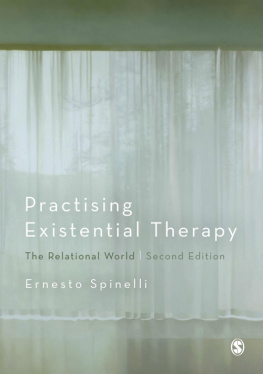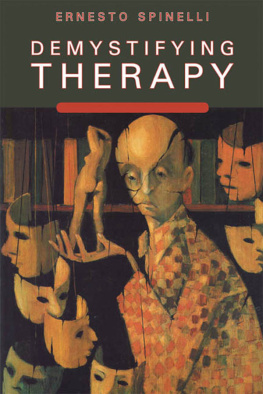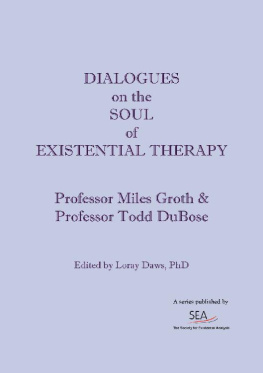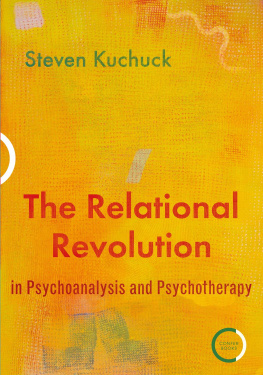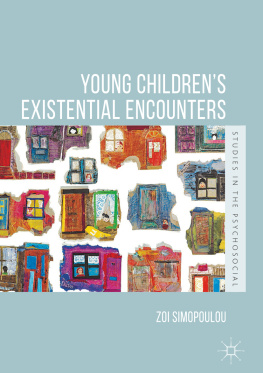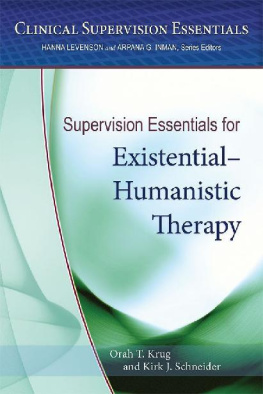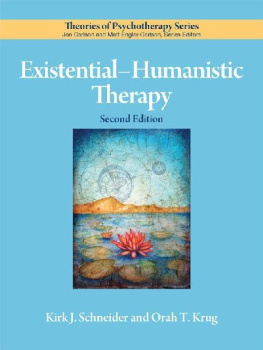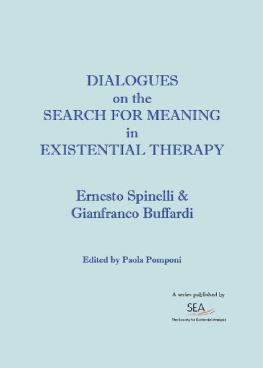SAGE has been part of the global academic community since 1965, supporting high quality research and learning that transforms society and our understanding of individuals, groups, and cultures. SAGE is the independent, innovative, natural home for authors, editors and societies who share our commitment and passion for the social sciences.
Find out more at: www.sagepublications.com
Ernesto Spinelli 2015
First edition published 2007. Reprinted 2007, 2008, 2010, 2011, 2013
Second edition published 2015
Apart from any fair dealing for the purposes of research or private study, or criticism or review, as permitted under the Copyright, Designs and Patents Act, 1988, this publication may be reproduced, stored or transmitted in any form, or by any means, only with the prior permission in writing of the publishers, or in the case of reprographic reproduction, in accordance with the terms of licences issued by the Copyright Licensing Agency. Enquiries concerning reproduction outside those terms should be sent to the publishers.
Library of Congress Control Number: 2014940294
British Library Cataloguing in Publication data
A catalogue record for this book is available fromthe British Library
ISBN 978-1-4462-7234-3
ISBN 978-1-4462-7235-0 (pbk)
SAGE Publications Ltd
1 Olivers Yard
55 City Road
London, EC1Y 1SP
SAGE Publications, Inc.
2455 Teller Road
Thousand Oaks, California 91320
SAGE Publications India Pvt. Ltd.
B 1/I 1 Mohan Cooperative Industrial Area
Mathura Road
New Delhi 110 044
SAGE Publications Asia-Pacific Pte. Ltd
3 Church Street
#10-04 Samsung Hub
Singapore 049483
Editor: Susannah Trefgarne
Assistant editor: Laura Walmsley
Production editor: Victoria Nicholas
Copyeditor: Christine Bitten
Proofreader: Louise Harnby
Indexer: Silvia Benvenuto
Marketing manager: Camille Richmond
Cover design: Shaun Mercier
Cover image: Veil 20 . Oil on linen, 2007 Paul Winstanley
Typeset by: C&M Digitals (P) Ltd, Chennai, India
Printed by: Henry Ling Limited at the Dorset Press, Dorchester, DT1 1HD
At SAGE we take sustainability seriously. Most of our products are printed in the UK using FSC papers and boards. When we print overseas we ensure sustainable papers are used as measured by the Egmont grading system.
We undertake an annual audit to monitor our sustainability.
This book is dedicated to my dear friends and colleagues
Bo Jacobsen, Rimas Kociunas, Arthur Jonathan and Ismail Asmall.
Thank you for your unlimited optimism and encouragement and your wisdom.
And to the memory of
Hans Cohn,
who, I suspect, would have both appreciated and disapproved of this book,
and
Freddie Strasser,
the most wonderfully optimistic pessimist (or pessimistic optimist?) I have ever had the pleasure to know,
and
Al Mahrer
who asked all the right questions and dedicated his life to searching out their answers.
Contents
About the Author
Professor Ernesto Spinelli has gained an international reputation as one of the leading contemporary trainers and theorists of existential analysis as applied to psychology and psychotherapy and, more recently, the related arenas of coaching and conflict mediation. He is a UKCP registered existential psychotherapist, a Fellow of the British Psychological Society (BPS), and the British Association for Counselling and Psychotherapy (BACP), as well as an accredited executive coach and coaching supervisor. In 1999, Ernesto was awarded a Personal Chair as Professor of psychotherapy, counselling and counselling psychology and in 2000 was awarded the BPS Division of Counselling Psychology Award for Outstanding Contributions to the Advancement of the Profession. Ernesto is Director of ES Associates, an organisation dedicated to the advancement of psychotherapy, coaching and supervision through specialist seminars and training programmes.
Acknowledgements
(Second Edition)
I am grateful to Sage Publications and, in particular, Susannah Trefgarne and Laura Walmsley, for having encouraged me to prepare a new edition of this book. It is a great gift for an author to be given the opportunity to clarify and extend a number of his more obscure ideas and arguments, as well as add some new ones.
If this new incarnation of my book strikes its readers as being somewhat more accessible, it is largely so because of the input and suggestions of a number of people whom I am honoured to call my friends. Thank you, Stuart, Bill, Yaqui, Mick, Greg and Todd. I cant express in words how touched I am by your generosity.
My professional life has changed substantially since the publication of the first edition. Following a great deal of soul-searching, I decided to leave my academic home of 20 years. While my leave-taking was not without sadness and more than a touch of anger, over and above anything else, I remain very much in debt to the School of Psychotherapy and Counselling for the opportunities it provided for me to develop my thinking and to find my voice as lecturer and writer. More than that, my affection towards, and respect for, the many colleagues, trainees and students whose lives touched mine during those years far outweigh whatever institutional toxicity we all endured. I have no doubt that if anything of interest, much less wisdom, exists in this book, it is largely due to the dialogues and encounters we engaged in with one another. Thank you.
Finally, as ever, a heartfelt, if all too inadequate, thank you to my wife, Maggi Cook, for her tireless support, her patient reminders to just get on with it and, more than anything, her being.
Ernesto Spinelli
London, 2014
Acknowledgements
(First Edition)
The origins of this book can be traced back to a series of seminars that I facilitated on the Advanced Diploma in Existential Psychotherapy programme offered at the School of Psychotherapy and Counselling, Regents College, London. I am grateful to all of the trainees who participated in these seminars for the wealth of critical insight that they brought to our discussions. I am grateful, as well, to my colleague and Director of the programme, Ms Lucia Moja-Strasser, for having permitted me to present my views and ideas even though she was well aware of some of the confusion and controversy that they might provoke for the trainees.
I would also like to acknowledge the very generous and equally patient staff at SAGE Publications and, in particular, Alison Poyner, Senior Commissioning Editor. Alisons faith in this book at times surpassed my own. I hope that she will find her efforts to have been worthwhile.
I am very grateful to have been given the opportunity to travel to many parts of the world in order to meet with all manner of colleagues and trainees who share this odd passion for, and fascination with, existential psychotherapy. The informal discussions we have had have influenced and shaped this book in a multitude of ways. Thank you all and in particular to my friends from The Society for Existential Analysis, UK; the I-Coach Academy, UK and South Africa; The Forum for Existential Psychotherapy, The London Group, The Copenhagen Group and The New School of Psychology in Denmark; the Portuguese Society for Existential Psychotherapy; the East European Association for Existential Therapy in Lithuania; the Australian Existential Society and Psychotherapy in Australia; the International Society for Existential Psychology and Psychotherapy in Canada; the Psychology Department at Duquesne University, Pittsburgh, Pennsylvania, USA; the International Human Science Research Group; and, of course, my comrades past and present, staff and students at the School of Psychotherapy and Counselling, Regents College.






